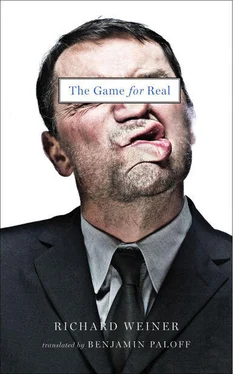“Make no mistake, the shop girl is alone. What I gave you (after the words ‘what I gave you’ he became certain that Tiemen would never, ever pronounce the word ‘club’) — hide it up your sleeve. Yes, it’ll fit, it’s the right size. But don’t you go using it before I give you the signal. I spill blood only if it can’t be avoided. I don’t like blood, you know, and I hope I succeed in making the robbery easy for you, so you’ll find murder unnecessary. But it’s not so much about avoiding the guillotine, but that it’s more elegant without bloodletting.”
All of a sudden a doorman approached them from behind, and in a manner that left not the slightest doubt that the word “guillotine” was the prearranged sign for him to step out onto that stage. He opened the door for them with a deep bow, saying:
“If I’m not mistaken, you’re the two gentlemen who are supposed to steal the platinum bracelet with rubies. Right this way!” Tiemen nodded quite affably toward the doorman, and they went in. The saleswoman was, in all sincerity, Mrs. Steel. But only for a few seconds. Before you knew it, the saleswoman, while remaining a saleswoman, ceased being Mrs. Steel. The fault lay with a hairy wart, about which our hero (and this annoyed him) was altogether incapable of saying whether it might have come about immediately, or whether he had simply overlooked it at first. A few seconds later, however, and here was Mrs. Steel again, and this despite the hairy wart, which went on as a hairy wart, but which the genuine Mrs. Steel — he was sure of it — did not have. He couldn’t handle it, he lost his cool, he was already letting down the club hidden up his sleeve when this shop girl, bowing gracefully, said:
“Oh no, I’m not Mrs. Steel. But what can I get you? Perhaps that beautiful platinum ruby bracelet that you, planning your burglary, have been eyeing for so long? I’ll get it for you.”
“Nowise have we a robbery planned,” Tiemen responded, trying primarily to deceive those listeners, of whom there happened to be none, who might have known Old Czech syntax better than he, who hadn’t the least notion of it, being almost illiterate, “and that bracelet, magnificent though it is, is not the bauble we wish for above all, albeit nowise excluding its purchase, should it come to that. . First let’s see the rings,” he added in modern Czech, but apparently just to clear away — in vain, ultimately — the impression of that Czech which he took for the Czech of Chelčický’s Net of Faith .
It’s just as obvious from the retort of the hero, put off by Tiemen’s chosen speech to the point that he exploded, “What’s with this talk, now?. . If you please!”
But Tiemen, as if he had expected the crotchety reprimand, already had a gesture prepared, which meant: “Leave it to me, alright? I know what I’m doing.”
But just then the saleswoman returned with a velvet tray full of rings, which she very slowly placed on the counter. At the same time, she moseyed with a serene look over to Tiemen’s eyes, then she moseyed with a serene look over to the other’s eyes, thereby expressing that she was rebuking them, if only carelessly. When she had done so, she lowered her suddenly as-though-enamored eyes to the mat, saying, “Are you perhaps talking about the revolver. .? Because if you are perhaps talking about the revolver. .,” and with her left hand she opened some drawer, into which she plunged her right hand, which she left there with a meaningfully threatening mischievousness.
“But it’s too soon for that,” Tiemen snapped at her, in a friendly way, “how many times have we rehearsed this, and you keep messing it up over and over.”
“I’m sorry,” Mrs. Steel said with prearranged mortification — now it was Mrs. Steel again — and she withdrew her hand. Hardly had she done so, however, than Tiemen leaped forward, dug into the half-open drawer, and took out the revolver. He stuck it into his pocket, and with a triumphant glance at Mrs. Steel he said to our fellow, “There — and now you no longer have anything to be afraid of.”
“I can see that the rings say nothing to you (that is, she was speaking French, and she had literally said, ‘. . ne vous disent rien ’), so I’ll show you something else. Perhaps women’s cigarette cases?”
“Women’s cigarette cases, after all, were not in the program (‘I’ve never said a word to you about women’s cigarette cases,’ Tiemen muttered in the style of an actor’s ‘aside,’ ‘and it’s unbelievable how forgetful you are’), but fine, bring them. But don’t forget that nothing is going to appeal to us, not even among the things that will lead quite naturally to the bracelet.”
“I’d rather get right to it.”
“Right you are,” said Tiemen, suddenly irritated by God-knows-what, “right you are, at least we’ll get through it faster, and why should I make so much fuss if I see that this nincompoop loses all the same, one way or another?”
“What nincompoop?” asked he who lived between two doors.
Mrs. Steel covered her mouth with her hand, and, brushing back her ringlets, she choked discreetly.
“Oh you!” and Tiemen, like a Gypsy cattle-rancher at a cattle-ranching Gypsy, winked at her, who was again no longer Mrs. Steel. “But let’s move on,” he roared, with his eyes following the saleswoman carrying the bracelet.
“Now,” Tiemen moved on, settling into an armchair that the doorman had pulled up for him, “now, as you know, in no time it will come to the orchestrated confluence of people on the sidewalk across the street. The gunfire — at random— which will then break out will divert your attention.” (Tiemen turned to the door.) “My comrade will use this distraction to swap the actual bracelet for a fake one.”
Tiemen fell silent, he was gawking at the street, where there was nothing at all; a moment later he started pounding angrily on the armchair. This failure of direction was so infectiously awkward that it brought about embarrassment even for him who had come here to steal for real. An awkward pause came about: Mrs. Steel was wiping her mouth; Tiemen was pacing nervously; the doorman walked with an apologetic expression from the armchair to the door; and the virtuous thief, him there, was seized by the kind of feeling an actor has when his scene is cut short by an order to start all over again.
“Alright then!” an angry Tiemen mumbled. “And after all those rehearsals! Missing extras!. .”
But just then, a sudden and deep relief: On the sidewalk across the street, from out of nowhere, there was a dramatically riled-up mob, and the mock gunfire started its rat-tat-tat. Tiemen spread out again comfortably and shouted eagerly, “Hurray! Attention diverted! Is your attention diverted?”
“It is,” the saleswoman said with such affected intensity that it would have been an insult anywhere else.
“Good!” said Tiemen, and after nodding at the other fellow with the smug swagger of a virtuoso bandleader who, having provided the first couple of bars, leaves the rote-performing orchestra to its own devices, he said, “Now perform!”
Yet here there rang out such a dissonance that Tiemen, the bandleader departing nonchalantly, promptly returned to the conductor’s stand.
“Perform!. . But how? I don’t have a fake. I don’t have anything to replace the bracelet with! A fake! You haven’t said a word about a fake.”
“You haven’t said so much as a word to me about a fake, not a word,” Tiemen teased, while Mrs. Steel held her sides, “but of course I haven’t said a word to you about it. . Since when do we speak of obvious things?. .”
“Idealist!” the saleswoman coughed.
“But how many times have I told you,” Tiemen yelled, and for real now, “that I don’t want any blood unless it’s necessary. And when there’s no blood, there’s slickness and ingenuity, surely that goes without saying. — Idealist? A moron! He wants to steal, the hero, he wants to steal when it’s already gone out of style. Or perhaps you’ve never even heard of deceit? Deceit, my little chickadee! So what’s his business among thieves if he doesn’t know how to deceive, what business does he have among people, the moron? Why do you make everything so difficult for yourself? My word — out with the fake.”
Читать дальше












